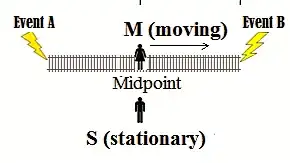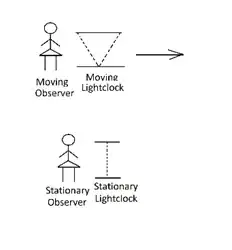Which clock or observer conclude that time dilation has occurred? Is it the stationary clock/observer or the moving one? (Please bear in mind that each observer/clock independently concludes that one second has lasped according to their lightclock)
 The stationary observer concludes that Event A and B occured simultaneously. The moving observer concludes that Event B occured first. Who then concludes that Simultaneity is Relative?
The stationary observer concludes that Event A and B occured simultaneously. The moving observer concludes that Event B occured first. Who then concludes that Simultaneity is Relative?
